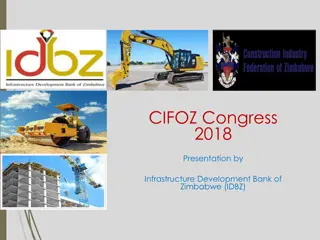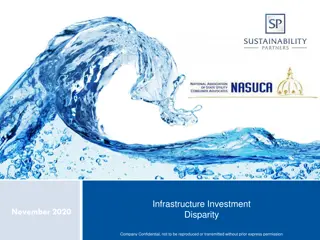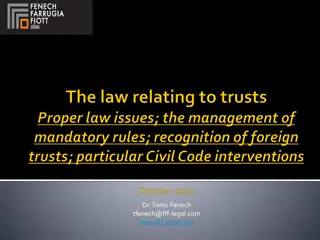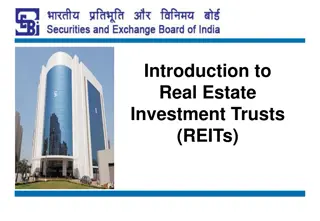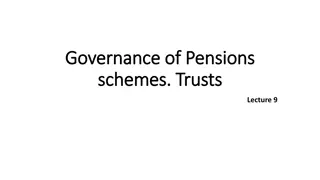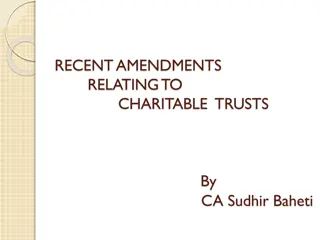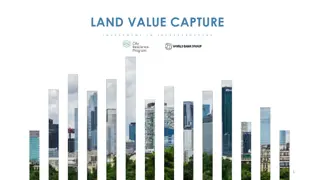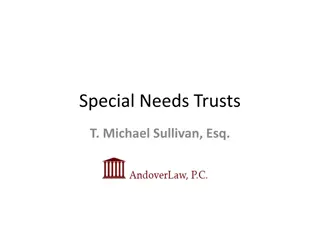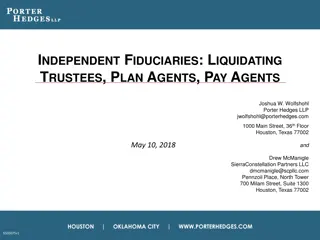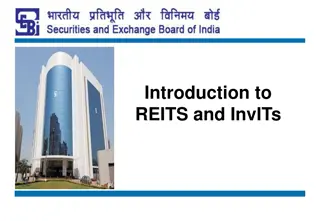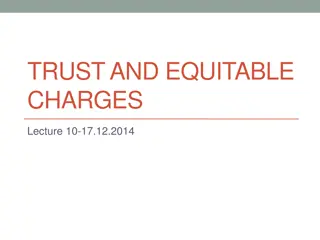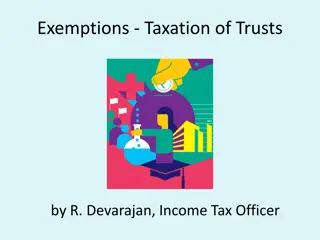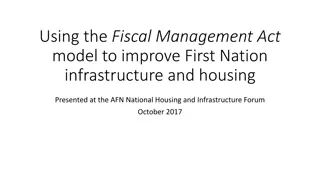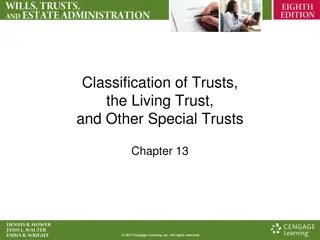Understanding Infrastructure Investment Trusts (InvITs)
Infrastructure Investment Trusts (InvITs) are like mutual funds that pool money from investors to own and operate operational infrastructure assets such as highways, pipelines, and power plants. They offer regular income and long-term capital appreciation. This presentation covers the overview, structure, constituents, cash flow, benefits, investing criteria, taxation, and key considerations related to InvITs.
Download Presentation

Please find below an Image/Link to download the presentation.
The content on the website is provided AS IS for your information and personal use only. It may not be sold, licensed, or shared on other websites without obtaining consent from the author. Download presentation by click this link. If you encounter any issues during the download, it is possible that the publisher has removed the file from their server.
E N D
Presentation Transcript
Introduction to Infrastructure Investment Trusts (InvITs)
Disclaimer Disclaimer Information contained in this presentation is as on December 10, 2021 The information contained in this presentation is only for Educational and Awareness Purposes related to securities market. This presentation is only for Educational and Investor Awareness Programs and shall not be used for any legal interpretations. SEBI or Stock Exchanges or Depositories shall not be responsible for any damage or loss to any one of any manner from use of this material. Suggestions or feedbacks, if any, may please be sent by mail to visitsebi@sebi.gov.in. 2
Flow of Presentation Flow of Presentation 1. What are InvITs? - Overview; 2. Structure of InvITs; 3. Role of Constituents in InvITs; 4. Cash flow in InvITs; 5. Benefits of investing in InvITs; 6. Who can invest in InvITs; 7. How to own Units of InvITs; 8. Rights of unitholders in InvITs; 9. Taxation aspects of InvITs; 10. Points to ponder before investing in InvITs. 3
What are InvITs? - Overview InvITs stands for Infrastructure Investment Trusts. InvITs are also like mutual funds that pool money from investors. InvITs own and operate operational infrastructure assets like highways, roads, pipelines, warehouses, power plants, etc. They offer regular income (via dividends) and long-term capital appreciation. InvITs allow pooling of money from multiple investors into a single trust Trust which is professionally managed by an Investment Manager Investment Manager invests in infrastructure assets or special purpose vehicles (SPVs) holding such infrastructure assets. There are listed InvITs, which are traded on the stock exchanges and investors can buy and sell InvIT units just like trading of shares of any listed company. There are unlisted InvITs as well, in which large institutional investors can participate. 4
Structure of InvITs Sponsor Investor Sets up InvIT Lock-in restrictions No lock-in units freely tradeable from listing date TrusteeshipFee Asset ManagementFee Trustee InvestmentManager InvIT InvIT Manages and makes investment decisions in relation to underlying assets Holds InvIT s assets for the benefit of unit holders 100% equity O&M Contracts Project Manager SPV 1 SPV 2 SPV 3 Undertakeoperationsand management of InvITassets Assets Assets Assets 5 SPV: Special Purpose Vehicles
Role of constituents in InvITs Sets up the InvIT Transfers its shareholdings in SPV / assets to the InvIT Appoints the Trustee Sponsor Holds the InvIT assets in trust for the benefit of the unit holders Responsible for ensuring that the business activities and investment policies comply with the provisions of the regulations Sets the strategic direction of the InvIT and decides on the acquisition, divestment or enhancement of assets Responsible for all activities related to issue and listing of units Takes decisions on distribution to unitholders Makes disclosures to various regulations Ensures redressal of investor grievances Trustee Investment Manager stakeholders as per Project Manager Responsible for day-to-day operations and maintenance of the assets 6
Cash flow in InvITs : An illustration Unitholder Distributed to Unitholders For tax treatment in the hands of Unitholders, distributions are divided into Dividend Interest Return of Capital Unitholders make investment in to InvIT by subscribing to its units InvIT Distribution in the form of : Dividend Interest Return of Capital InvIT invests into SPVs in the form of Equity and debt SPV 1 SPV 3 SPV 2 7
Where can an InvIT invest its funds ? At least 80% of the value of a public InvIT to be invested in completed and revenue - generating infrastructure projects. A maximum of 20% of the total value of InvITs can be from: Under construction infrastructure projects Listed or unlisted debt of the companies in the infrastructure sector (other than debt of Holding Company/SPV) Equity of listed companies in India generating at least 80% of their income from the infrastructure sector Government securities, money market instruments, liquid mutual funds or cash equivalents Privately placed InvITs can have any mix of under construction and completed infrastructure projects. 8 -
Key Features of InvITs Focus Asset Class: Predominantly completed Infra Assets with >=80% of the value of the InvIT from revenue-generating infrastructure projects Key Unit Holders Rights: To vote on matters related to a) material acquisition/borrowing; b)appointment/change of IM; c) induction/exit of a Sponsor Mandatory Distribution: 90% of the net distributable cash flow must be distributed to unitholders InvITs Strong Corporate Governance : Independent trustee & valuers, >=50% independent directors, additional disclosure and rating requirements Leverage Management: Net borrowing capped at 70% of AUM (if it is rated AAA) Tax Efficiency: Trusts have pass-through structures, i.e., they are not taxed Presence of Risk Controls and Regulatory Systems Leads to Strong Corporate Governance 9
Benefits of investing in InvITs InvIT 1 2 3 4 5 6 Free Up Developer Capital for Reinvestment into New Infrastructure Projects To Bring Higher Standards of Governance into Infrastructure Development and Management Facilitation of ownership of diversified Infrastructure Assets for retail investors Low-risk investments offered to attract long- term investors such as insurance and pension funds Provide Long-term Financing Option for Existing Infrastructure Projects Growth Potential for Investors InvITs facilitate creation of infrastructure assets by providing better financing and ownership opportunity while generating healthy returns for investors 10
Who can Invest in InvITs? Any investor (domestic / foreign / retail / institutional) can buy InvIT units in India; The minimum subscription amount for public InvITs is in the range of 10,000 to 15,000/- and the trading lot is 1 unit. (revised w.e.f. July 30, 2021) Previously it was 1 lakh & 100 units, respectively. Investors can purchase InvIT units through a Demat account, similar to how they would purchase equity shares; InvITs are suitable for those who wants to take price benefits / returns from Infrastructure projects, roadways. InvITs are also suitable for those who wish to have infrastructure sector in their investment portfolio 11
How to own units of InvITs Investors can own InvITs in following manner: By subscribing to issue in Initial Public Issue (IPO) or Follow- on Issue of InvITs, By purchasing units of InvITs from Stock Exchange, where they are listed, Procedures for the bidding, application, payment, and Allotment of InvITs Units in Public Issue (IPO or Follow-on Issue) Price of Units shall be determined through Book building process, Investors are required to participate in the Issue only through the ASBA process 12
How to own units of InvITs (. contd.) Investors are required to pay the full Bid Amount or instruct the bank to block the full Bid Amount at the time of Bidding, Investors should note that Allotment to successful Bidders will be only in the dematerialized form, Mention correctly the details of the Bidders depository accounts including DP ID, PAN and Client ID Bid cum Application Forms, Units of InvITs are listed on a stock exchange within 12 working days from the close of issue. 13
Rights of unitholders in InvITs Right to receive returns through cash distributions made by the trust Right to vote on matters pertaining to acquisition of new assets or borrowing Right to vote on related party matters Right to vote on matters such as appointment or change of the Investment Manager Right to vote on induction of a Sponsor, with the opportunity to exit for dissenting voters Right to vote on exit of Sponsor Right to receive periodic disclosures like annual report, valuation report, quarterly/ semi-annual financials, etc. 14
Taxation aspects in InvITs Nature of Distribution Tax Treatment in the hands of Investor # Interest income Taxable Dividends Exempted (If the SPV has not opted for the lower tax regime) Taxable (If the SPV has opted for the lower tax regime) Revenue from underlying infrastructure assets Taxable # Investors need to check which type of income they receive and applicable tax treatment. 15
Regulations to protect the interests of InvITs unitholders Securities Exchange Board of India (SEBI) SEBI (InvITs) Regulations, 2014 SEBI (Listing Obligations and Disclosure Requirements) Regulations, 2015 SEBI (Prohibition of Insider Trading) Regulations, 2015 Reserve Bank of India Foreign Exchange Management (Non-debt Instruments Rules), 2019 Indian Trusts Act, 1882 Others Companies Act, 2013 Competition Act, 2002 16
Points to Ponder while investing in InvITs Stability of income of Trust depends on the stability of income earned from the assets of Trust, Invest in InvITs which offer better transparency, Investment in InvITs is to generate income and also to earn capital gains Due diligence to be made before taking investment decisions 17
18 5. Additional Information For Further Information, you may visit following websites: w w w. s e b i . g o v. i n / https://i n v e s t o r. s e b i . g o v. i n / For Grievance Redressal, you may visit following website: w w w. s c o r e s . g o v. i n / Or, you may call SEBI at following Toll-free Helpline Numbers from 9:00am to 6:00pm on all days (excluding declared holidays in the state of Maharashtra): 1800 266 7575 1800 22 7575 Helpline is Available in 8 Languages: English, Hindi, Bengali, Gujarati, Marathi, Kannada, Telugu and Tamil 18
THANK YOU 19



